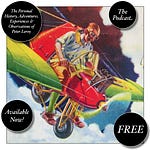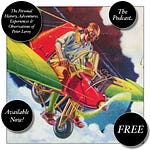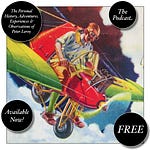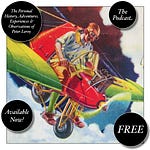“SAY,” says one of the young men to the bartender, tapping him on the arm to take his attention away from the drink he’s mixing, “would you pack all of this up?” He waves his hand over the remains of their snacks — Matthew’s nachos and some ribs and a huge pick-up-stick tangle of fries.
“I’ll send a busboy over,” says the bartender, too busy and too cool to be annoyed.
“What are you doing?” asks one of the girls. “We’re not going to take all this with us.”
“I’m going to send this out as a contribution to the homeless. You see the guy out front?” They turn, as one again. Outside the restaurant, in front of one of the windows that now fill the openings through which fire apparatus once drove, is a man Matthew has seen on the streets before, often, in fact, since he lives in Matthew’s neighborhood, in the lobby of an automatic teller machine installation on Boylston Street, near Fairfield. Matthew has seen the man in Copley Square, sitting on the steps of the library, and sometimes wading in a reflecting pool inside the entrance to the Westin Hotel, scooping pennies, watching for the security guards, but most notably and most often he has seen him on Dartmouth Street, between Boylston and Newbury, where, as he is doing now, he performs a drunken version of a dance that, it seems clear to Matthew, is meant to please, perhaps some dance he did as a child, when it earned him a caress, a treat, a quarter, just what he’s after now. Always drunk, he slips and staggers as he dances, and people avert their eyes, change course to avoid him. Once when Matthew saw him in the pool at the Westin, though, some children were riding up the escalator, trying not to look, as if they thought it must be impolite, but they couldn’t keep themselves from looking, from giggling. The man became aware of them, turned, waved in an oddly endearing way, as if he had had training in this gesture, this endearing wave, as if he had once been a clown. He went into his dance, fell down in the water, and sent the children away laughing openly, gladly. Outside, he’s doing his dance now, stumbling as he does.
“The clown,” says Matthew. Tracy gives him a questioning look. “I think of him as the clown. I see him around. See the little dance he’s doing? He’s like a clown. Maybe he really was a clown once, but there isn’t much work for clowns these days, and that’s why he’s out of work. What do you think?”
Matthew, shut up. You’re going to ruin everything.
The bartender pushes the check across the bar, toward Matthew. There is no ambiguity about this. There is only one check. Matthew’s expected to pay it. The students do not even seem to realize that it exists. Matthew hesitates for a moment, a moment during which he suspects that he’s being played for a sucker, and then he puts his American Express card on the check and pushes it back across the bar.
“Well, I’m giving this stuff to the clown,” says the munificent lad. “It’s nacho night on the streets.”
“Oh, wait a minute,” says the girl who once visited Peru. She reaches under her skirt, brings her hand out with the middle finger extended, wipes it along one of the chips. “My contribution to the homeless,” she says.
Matthew is disgusted. For an instant, he thinks of acting. He could simply remove that chip and deposit it on the bar, saying nothing. What would Tracy think of that? Or he could grab the girl by the wrist and tell her what a revolting little pig he thinks she is. Or he could slap her, hop off his stool, and storm out of Ike’s, never looking back.
Oh, cut it out, says BW. Are you disgusted or just envious? You want that chip for yourself?
What a bitch. They’re disgusting, these kids, all of them.
I thought they were the salvation of the earth.
A busboy arrives with foam containers. He dumps the leftovers into the containers. In this state, jumbled, inverted, the food looks like garbage.
“Take it out to the clown on the sidewalk.”
“Hey, I’m not going to do that.”
“Twenty bucks.” The bill emerges as if from nowhere, as if the boy were performing a trick his doting father taught him.
The busboy takes the money quickly, pockets it, and takes the containers outside.
The group follows, and when they pass the clown, now balancing foam boxes, they salute him, call out to him, whistle, laugh. Matthew worries that the clown will forget himself and wave, drop the boxes, make himself ridiculous, or, worse, that he’ll spot Matthew and make some sign of recognition, making Matthew ridiculous. He passes with his head down, like a racketeer on the evening news.
[to be continued]
Have you missed an episode or two or several?
You can begin reading at the beginning or you can catch up by visiting the archive or consulting the index to the Topical Guide.
You can listen to the episodes on the Personal History podcast. Begin at the beginning or scroll through the episodes to find what you’ve missed.
You can listen to “My Mother Takes a Tumble” and “Do Clams Bite?” complete and uninterrupted as audiobooks through YouTube.
You can ensure that you never miss a future issue by getting a free subscription. (You can help support the work by choosing a paid subscription instead.)
At Apple Books you can download free eBooks of Little Follies and Herb ’n’ Lorna.
You’ll find overviews of the entire work in An Introduction to The Personal History, Adventures, Experiences & Observations of Peter Leroy (a pdf document) and at Encyclopedia.com.














Share this post